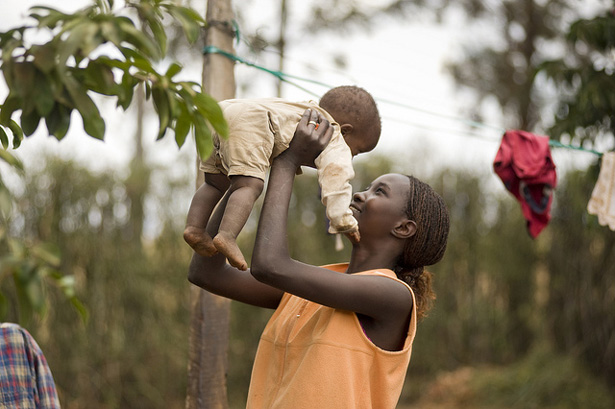-
Building a Global Network of Maternal Health Policymakers
January 18, 2013 By Sandeep Bathala
On day three of the 2013 Global Maternal Health Conference here in Arusha, Tanzania, I was joined by the Global Health Initiative’s partners to present the results of the Wilson Center’s four-year-old Advancing Dialogue on Maternal Health Series. This series is unique in its convening power, helping to bring together experts and policymakers from around the world to collaborate on a shared goal: healthier mothers and children.
From 2009 to 2012, the Global Health Initiative co-convened 22 public meetings and three private workshops with the Maternal Health Task Force and United Nations Population Fund to identify challenges and discuss strategies for moving the maternal health agenda forward. In 2011, we collaborated with the African Population and Health Research Center (APHRC) to host two simulcasted videoconferences in Nairobi, Kenya, and Washington, D.C., which allowed maternal health experts and officials from both countries – including several Kenyan Parliament members affiliated with the Health Committee and Network for Population and Development – to share experiences and best practices. In partnership with the Population Foundation of India, we are planning a similar dialogue with local, regional, and national decision-makers on effective maternal health policies and programs in New Delhi, India, this year, as well as more D.C.-based meetings.
By convening both in Washington, D.C., and globally, the goal of the series is to create a platform for fieldworkers, policymakers, program managers, media, and donors to share research, disseminate lessons learned, and address concerns related to policy, institutional, and organizational capacity building. These are many of the same themes being discussed at the Global Maternal Health Conference here in Tanzania.
Ruthpearl Wanjiru Ngángá, APHRC’s communications manager, highlighted some of the results that emerged from the videoconferences.
Broadly, she said they found that connecting maternal death to economic loss is a powerful and effective strategy, and it’s important to increase accountability by addressing the gap between what policymakers say and what they actually do to improve maternal health.
Webcast of the first Nairobi-Washington event at the Wilson Center All the policymakers attending pledged to do something based on what they learned at the meetings, ranging from building maternal health shelters and lobbying to working to unify the Ministry of Health in Kenya, which is currently split between ministers of public health and medical services (duplicated funds would be used to strengthen the Division of Reproductive Health).
Participants also established dialogue between the ministries of health and finance to jointly identify priority areas and to ensure that 15 percent of the Kenyan national budget goes to health efforts, as per the Abuja Declaration.
Perhaps the most striking pledge was made by a member of Parliament who did not attend the videoconferences but was motivated after hearing about them: He pledged to coordinate a day once a month where pregnant women in remote areas could consult with Nairobi-based doctors through e-medicine.
And the commitments, it turns out, were not empty. Since the meetings concluded Ruthpearl said they have seen additional outcomes including a parliamentary retreat on maternal, newborn, and child care; increased press coverage, especially highlighting maternal and child health statistics and reporting on fatalities; and elevated interest in maternal health issues in general, including becoming a priority for the Kenya Women Parliamentary Association.
“Where I come from, husbands are delivering their wives,” Hon. Sophia Abdi Noor who represents the Somali region of northern Kenya, said later in a follow-up meeting.
And Hon. Farah Maalim, deputy speaker of the National Assembly, said at the parliamentary retreat that “we are running out of time towards the MDG deadline. There is need to reactivate the agenda on women and children’s health at the national level…the new constitution of Kenya declares health as a basic right for all Kenyans. Parliament has a pivotal role to play in ensuring the realization of this right.”
Moving forward, Ruthpearl said APHRC intends to focus on advancing public-private health sector partnerships in urban slums and to start a pilot study on improving maternal, newborn, and child care services for slum residents. She also said they are working to improve engagement with Kenya’s National Division of Reproductive Health on research and technical working groups and to improve the visibility of research in policy and program formulation in general.
Alongside Ruthpearl and I, Crystal Lander and Dr. Steve Solter of Management Sciences for Health also spoke on the panel, about their work with the Afghan Ministry of Public Health.
Dr. Luc de Bernis, senior maternal health adviser at UNFPA and one of the collaborating partners in this series, concluded the session by expressing his hope that these dialogues were contributing to a swelling global advocacy movement for improved maternal health outcomes. The audience in Arusha couldn’t have agreed more.
The Wilson Center’s Sandeep Bathala and Lauren Herzer blogged from the 2013 Global Maternal Health Conference in Arusha, Tanzania, from January 15 to 17, 2013.
Sources: Africa Science News, Family Care International.
Photo Credit: “Saving lives at birth,” courtesy of the Bill and Melinda Gates Foundation.
Topics: Africa, development, Dot-Mom, family planning, From GMHC 2013, global health, India, Kenya, maternal health, Tanzania, U.S., video
 A Publication of the Stimson Center.
A Publication of the Stimson Center.






